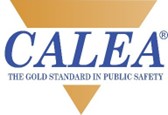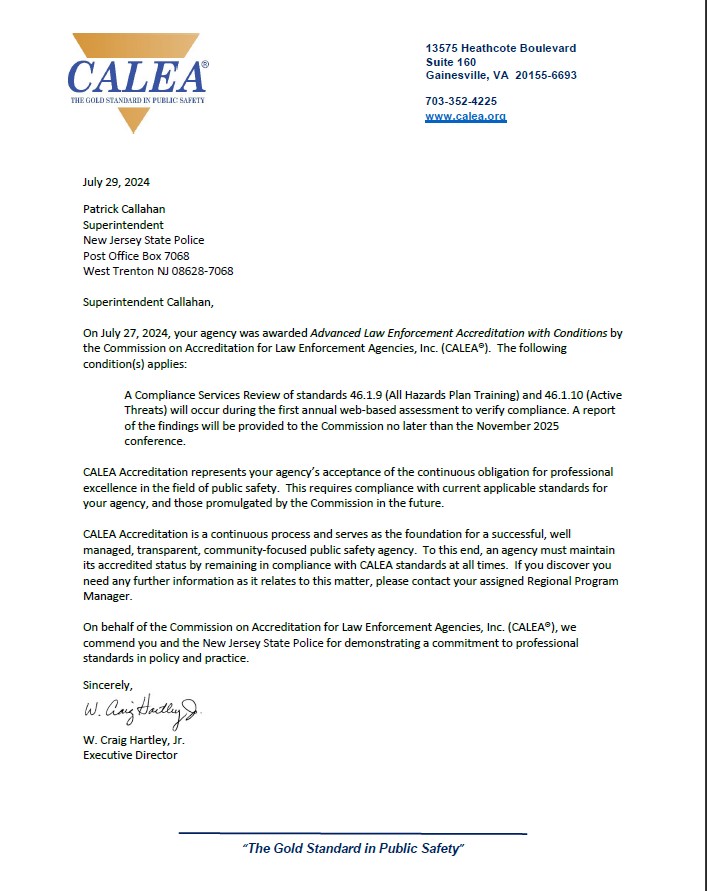You are trying to access the old NJSP website. You will be redirected to the new website automatically
Please bookmark the NEW website link at https://www.njsp.gov
CALEA -Commission on Accreditation for Law Enforcement Agencies
NEW JERSEY STATE POLICE - "COMMITMENT TO EXCELLENCE"

On July 28th, 2007, the New Jersey State Police received Law Enforcement accreditation after several years of intense reviews and grading. The New Jersey State Police exceeded the requirements of a highly regarded and broadly recognized body of Law Enforcement Accreditation standards and was accredited for a third time by C.A.L.E.A. on July 28th, 2013. This Re-Accreditation represents the satisfactory completion of a thorough agency-wide self-evaluation, followed by a comprehensive review by a team of independent assessors. On July 31, 2020, the New Jersey State Police received Training Academy accreditation after undergoing a similar review process to the Law Enforcement accreditation. New Jersey is one of only six state police and state highway patrol agencies in the U.S. with the Training Academy Accreditation. The New Jersey State Police is currently in the process of acquiring the Communications Accreditation, with an anticipated accreditation date of March 2025. The Accreditation Unit has been working towards this accreditation since August 2023. Currently, only four other state police and state highway patrol agencies in the U.S. hold the Communications Accreditation. There are more than 950 CALEA accredited police agencies holding the Law Enforcement accreditation, 110 holding the Training Academy accreditation and 225 holding the Communication Agency accreditation with many more currently in the process to gain those honors. New Jersey will be only the fifth state police agency in the U.S. to hold all three accreditations after March 2025.
Accreditation brings several significant benefits. Firstly, accreditation embodies the precepts of community-oriented policing. It creates a forum in which law enforcement agencies and citizens work together to prevent and control challenges confronting law enforcement and provides clear direction about community expectations. Secondly, accreditation provides objective evidence of an agency’s commitment to excellence in leadership, resource management, and service-delivery. Thus, government officials are more confident in the agency’s ability to operate efficiently and meet community needs. Additionally, accredited agencies are better able to defend themselves against civil lawsuits. Also, many agencies report a decline in legal actions against them, once they become accredited. CALEA standards give the CEO a proven management system of written directives, sound training, clearly defined lines of authority, and routine reports that support decision-making and resource allocation.

The Commission on Accreditation for Law Enforcement Agencies, Inc. (CALEA®), was created in 1979 as a credentialing authority through the joint efforts of law enforcement’s major executive associations. The CALEA Accreditation program seals are reserved for use by those public safety agencies that have demonstrated compliance with CALEA Standards and have been awarded CALEA Accreditation by the Commission. The 21-member Commission is made up of eleven law enforcement practitioners with the balance selected from the public and private sectors. Generally, the Commission reflects a representation from local, state/provincial, and international law enforcement and public safety organizations, along with business, academia, the judiciary, and state/provincial and local government. Commissioners are appointed in consultation with the four founding organizations and serve without compensation. Commissioners serve three-year, staggered terms. The Commission meets to review candidate agencies for accreditation and provide policy guidance for Commission operations.




